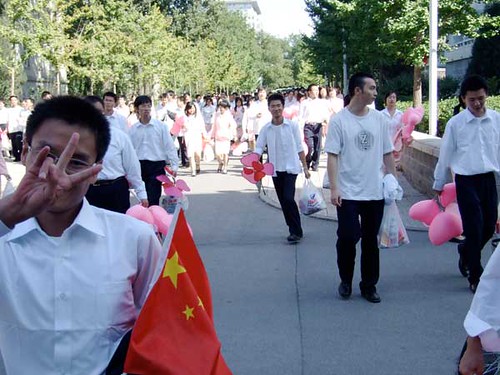In California last summer, on the train from Palo Alto to Berkeley, I met a graduate student from Taiwan who was in the US in a summer camp organised by Stanford University, bringing students from Taiwan and Japan over to the states for English and ‘American culture’ lessons.
It was her fourth time in the states, and I was interested in her research project for the camp: the stereotypes of Asians in the US, and how those differed between East Asians and American Asians. Well-worn ground, but I was curious what a young Chinese would make of it.
So I got her email just in time before my stop (if you’re bringing your bike on the Caltrain with you, you can forget where your bike lock key is, or which stop is yours, but not both) and here is the fruit of her labour, which I’ve edited for its English and for length. One interesting bit – besides the two lists of words – is her assumption that there has to be a stereotype (because there is in movies?) and her surprise at the by and large positive words her interviewees used to describe Asians with (to her face, so of course they were positive!).
More out of embarrassment at her essay than anything else I sense, she asks to remain anonymous (again, aargh).
*
The stereotype of Asians from Americans’ perspectives
Imagine you go to another country whose culture you are not familiar with, how would you feel if the people there have already developed some stereotypes about you? Most international students who come from Asia to the United States for higher education pursue science or engineering degrees. Most of the time, they are stereotyped as “good at solving math problems but probably poor at English”. Although some Americans don’t show this attitude directly, their behaviors still reveal that “East Asians tend to be more obedientâ€. Also, in American movies or sitcoms, Asians often play characters who know Chinese martial arts. Even in 2008, Batman: The Dark Knight, the director shaped a Chinese, Lau, as a greedy businessman. You can also see these kinds of characters in Jackie Chan’s movies.
My hypothesis is that Americans still have stereotypes about Asians. Therefore, I conducted a survey, asking twenty participants to fill in my questionnaire about their views of East Asians and American Asians. The participants were from downtown Palo Alto and Stanford University. They are mostly under twenty five years old, and have at least a high school degree.
… [I’m skipping the first section of her survey results, as it’s all obvious and a bit GCSE. In brief: participants responded they form ideas about East Asians from personal encounters much more than from media, TV or films; they mostly consider Asian American culture as distinct from mainstream American culture; and they are – unsurprisingly – more familiar with Asian American culture than East Asian culture. What’s below is more telling I think.]
Survey question number ten asked Americans to give some words to describe East Asians. Since it is an open-ended question, we got diverse words. I will list all the words here to give you a general picture of how they think about East Asians: hard-working, intelligent, submissive, ground-minded, family-oriented, community-oriented, discipline, thrifty, honest, fast, multi-culture, naïve, traditional, honorable, proud, humble, cultural, friendly, smart, polite, adhere to rules, homogeneous, outgoing, calm, enlightened, serene, enthusiastic, driven, well-manned, stick with their own people, nice, like to study, dedicated, foreign, immigrant, humble, educationally driven, hospitable.
Question number eleven asked Americans to give words to describe Asian Americans. The words they used included: like to study, sometimes socially awkward, ambitious, computer-using, smart, innovative, striving, respectful, educated, sensitive, confused, friendly, intelligent, family is important, assimilated, outgoing, calm, enlightened, serene, willing to help, adaptable, perfectionist, aware, accepting, independent.
During the survey, Americans tended to refuse to use negative words to describe Asian Americans, maybe they are afraid that they will stereotype Asian Americans, and some actually only wrote none or “They are Americansâ€. It’s interesting to see that they tend to use positive words in the open-ended question. All the more negative adjectives are original suggestions from my questionnaire. Maybe Americans find it hard to put their thoughts into words, and they just feel that Asian Americans are the same as them. We still need more data to find out.
I also interviewed four Asian Americans (all Stanford University students) about their personal experiences of being stereotyped. Over all, most of them talked about being stereotyped as good at maths and science. Two of them majored in were social sciences, so they actually said that they were not that talented at maths. Since the school’s peers and teachers expected them to be good at maths and science, it added more pressure to choose those subjects. Luckily, now they are studying what they really like now.





